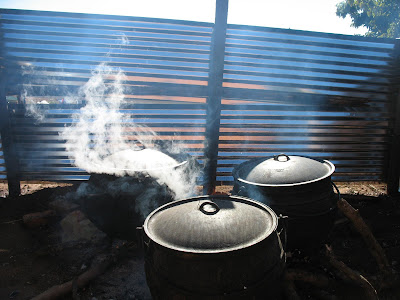




Some time back -- I refuse to admit how long ago -- I began the story of my friend Virginia Dlamini Akintola's lobola (wedding dowry) event, which was held last June. Unfortunately, I only managed to post a description of some of the pre-day preparations before I got busy/lazy then the Internet connection on campus failed. So here's some more of the rest of the story. These sections will describe the food preparations, as Sharon, her friend Phindi and I were asked to help with the catering.
The next several groups of photos illustrate the intensive efforts made by many friends and family members to prepare for this event. Some of the cooking started the day before, but the bulk of the preparations were done on the actual day. We started early in the morning, and you can see from the hat and jacket I'm wearing that it was chilly at first. The kitchen warmed up, though, once the stove got going. I think we were finished cooking and ready to serve the meal by around 2:00 p.m.
We made food for approximately 300 people, about half of them invited guests and the rest locals who stopped by for a meal. In fact, Virginia had been forewarned by the community feeding center that it would advise the locals to visit her lobola for their daily meal. (Most poor areas have a community facility at which volunteers cook and serve donated food to the many orphans, un or under-employed, and otherwise disadvantaged people.) So we had to plan to feed as many folks as showed up.
We were given an empty outbuilding to use as a kitchen; it was outfitted with a propane range and a couple work tables. Other prep work (endless chopping for stews and salads) went on outside, as did additional cooking.











